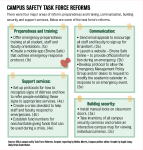Justin Gelzhiser stood by the door of a lecture hall with a box cutter and fire extinguisher for several hours, preparing to defend his class from an active shooter.
Gelzhiser, a Ph.D. candidate in the UCLA Graduate School of Education and Information Studies, was on his way to proctor an undergraduate final exam when his phone buzzed, alerting him that there was a shooting on campus.
“I got to the room and a girl was having a panic attack. … (Her friend) was in Engineering IV (where the shooting took place),” he said. “I walked into the room with her and 75 undergraduates in the department of communication and then our door didn’t lock, so we had to move all 75 students to the computer lab.”
Chancellor Gene Block called for the creation of the Campus Safety Task Force in 2016 following the June 1 murder-suicide to provide recommendations to UCLA administrative officials for preventing and coping with the effects of violence and other emergencies.
The task force suggested reforms in four main categories: preparedness and training, communication, building security, and support services. 62 out of 79 suggested actions have been completed as of Dec.15, 2017, according to the task force’s online status report.
Administrative Vice Chancellor Michael Beck, who led the task force, said he thinks the most important reforms have focused on better dispersing information before, during and after a crisis.
“I would say the most important piece, and we’re continuing to work on it, is improving communications,” Beck said.
The task force recommended the creation of the Bruins Safe app and Bruins Safe Online as part of its communications reforms. The app offers access to information such as emergency services’ contact information and step-by-step emergency plans for crises.
Eugene Volokh, a professor in the UCLA School of Law and an expert on gun control, said emergency alert systems can still be effective even if most students do not know they are operating.
“If you reach even half the students (with BruinAlerts), the remaining half may be near (the students who received the message),” Volokh said. “A message that reaches one person in a crowd can help inform the whole crowd.”
Volokh added he thinks it may be worthwhile to look into how people can fight back against a shooter even if they are unarmed.
“There may be value in training people to fight back even when they’re unarmed,” Volokh said. “Obviously it’s risky, but doing nothing is risky too.”
Beck said incoming students received a more in-depth security briefing during New Student Orientation this year.
“UCPD has always come to orientation but this was more specific: outlining Bruins Safe Online, explaining BruinAlert, talking about being prepared,” Beck said.
UCPD Lt. Kevin Kilgore said the orientation presentation included a video about how to react in an active shooter situation. He added that UCPD offers further active shooting training to interested student groups.
“At New Student Orientation, students see a run, hide, fight video. We will show (the video) again this year also,” Kilgore said. “We also offer active shooter training to any student group on campus to offer a longer discussion of what to do in these types of situations.”
Graduate Students Association president Michael Skiles knew William Klug, the associate professor killed in the 2016 shooting, through the Graduate Council, a committee within the UCLA Academic Senate. Skiles, who was in Westwood during the shooting, said that while UCLA has improved its security since the attack, he thinks updates should be more timely.
“(The UCLA administration) should ensure that when they put a message out, it is actually received … by email and by text, not hours later or sent to some spam box,” he said.
Beck said that the shooting was a tragedy, but should be used as an opportunity to improve campus safety measures.
“It was a horrific tragedy that happened on our campus, and it would be a bigger tragedy if we weren’t using it as an opportunity to improve safety services and preparedness functions on campus,” Beck said. “We have to use the opportunity to make sure the campus community continues to have (an) open environment but is a safe place for all.”
